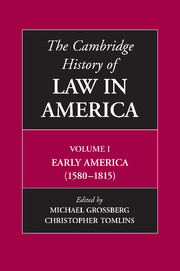Book contents
- Frontmatter
- 1 Law, Colonization, Legitimation, and the European Background
- 2 The Law of Native Americans, to 1815
- 3 English Settlement and Local Governance
- 4 Legal Communications and Imperial Governance: British North America and Spanish America Compared
- 5 Regionalism in Early American Law
- 6 Penality and the Colonial Project: Crime, Punishment, and the Regulation of Morals in Early America
- 7 Law, Population, Labor
- 8 The Fragmented Laws of Slavery in the Colonial and Revolutionary Eras
- 9 The Transformation of Domestic Law
- 10 Law and Religion in Colonial America
- 11 The Transformation of Law and Economy in Early America
- 12 Law and Commerce, 1580–1815
- 13 Law and the Origins of the American Revolution
- 14 Confederation and Constitution
- 15 The Consolidation of the Early Federal System, 1791–1812
- 16 Magistrates, Common Law Lawyers, Legislators: The Three Legal Systems of British America
- Bibliographic Essays
- Notes on Contributors
- Index
- References
16 - Magistrates, Common Law Lawyers, Legislators: The Three Legal Systems of British America
Published online by Cambridge University Press: 28 November 2008
- Frontmatter
- 1 Law, Colonization, Legitimation, and the European Background
- 2 The Law of Native Americans, to 1815
- 3 English Settlement and Local Governance
- 4 Legal Communications and Imperial Governance: British North America and Spanish America Compared
- 5 Regionalism in Early American Law
- 6 Penality and the Colonial Project: Crime, Punishment, and the Regulation of Morals in Early America
- 7 Law, Population, Labor
- 8 The Fragmented Laws of Slavery in the Colonial and Revolutionary Eras
- 9 The Transformation of Domestic Law
- 10 Law and Religion in Colonial America
- 11 The Transformation of Law and Economy in Early America
- 12 Law and Commerce, 1580–1815
- 13 Law and the Origins of the American Revolution
- 14 Confederation and Constitution
- 15 The Consolidation of the Early Federal System, 1791–1812
- 16 Magistrates, Common Law Lawyers, Legislators: The Three Legal Systems of British America
- Bibliographic Essays
- Notes on Contributors
- Index
- References
Summary
On two occasions in the late 1630s, the magistrates of the Lower Norfolk county court in Virginia imposed extraordinary punishments on white men accused of minor criminal offenses, ordering the sheriff to lay 100 lashes on the bare back. This was arbitrary justice, the summary infliction of severe corporal punishment by a few appointed justices of the peace. Eight decades later, in 1712, the Connecticut Superior Court discovered in the midst of a trial that the laws of colony made no distinction between murder and manslaughter. The court immediately asked for the permission of the Assembly to determine “by the rules of the common law” the seriousness of the crime and the consequent sentence. Legal precedent, the rules of the common law, would decide the defendant’s fate. Yet another eight decades later, in 1793, Vermont Chief Justice Nathaniel Chipman declared, “No Court, in this State, ought ever to pronounce the sentence of death upon the authority of a common law precedent, without the authority of a statute.” The legitimacy of a major criminal punishment now depended on the sanction of a popularly elected legislature.
Arbitrary seventeenth-century magistrates, rule-conscious eighteenth-century common law courts, statute-enacting nineteenth-century legislatures: in the years between 1600 and 1820, the white residents of British North America lived under three distinct, but overlapping and interrelated, legal systems. Each of these regimes was controlled by different personnel, operated according to different rules and procedures, and embodied a different legal ideology. Although all three systems were present throughout the period, their relative importance changed significantly over time and imparted a definable logic to the course of American law and politics.
- Type
- Chapter
- Information
- The Cambridge History of Law in America , pp. 555 - 592Publisher: Cambridge University PressPrint publication year: 2008
References
- 1
- Cited by

